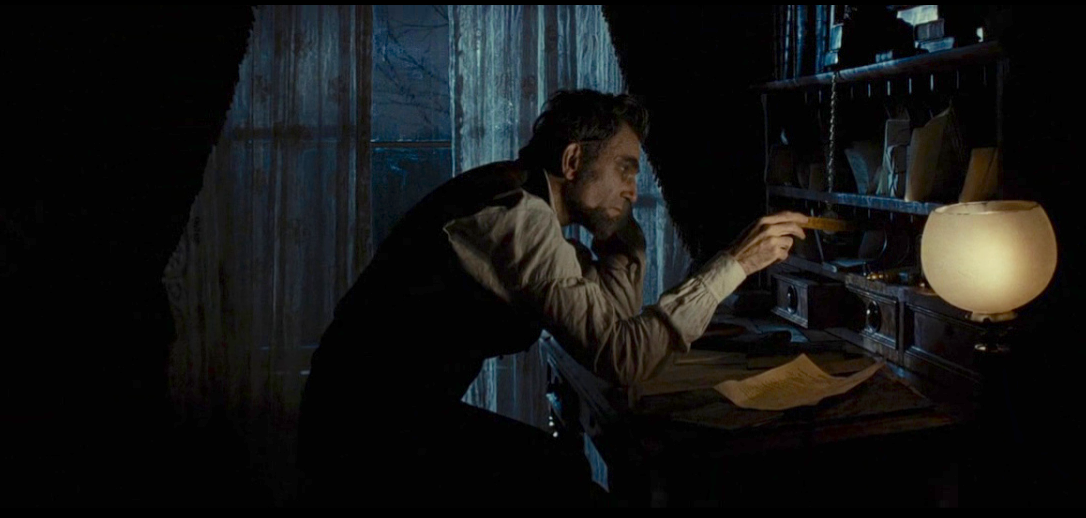
Abraham Lincoln's abilities as a writer probably would have earned him a place in history even without his accomplishments as a statesman. He is surely the best writer that has ever occupied the Oval Office. Capable of expressing complex ideas with remarkable economy, he had a deft hand with allusions and was responsible for many evocative turns of phrase that resonate far outside the political context of their time, “The better angels of our nature” or “The dogmas of the quiet past.” Hell, simply opting for “Four score and seven” over “eighty-seven” reveals a writer’s ear for the musical potential of language.
It's a fitting tribute then, that the most prominent film about the sixteenth president, Steven Spielberg’s Lincoln, with a screenplay by Pulitzer prize winning playwright Tony Kushner, exudes that same love of language. There’s scarcely a scene without some memorable linguistic spin. There's much to admire in Spielberg’s film from the beautifully worn production design to the momentous performances, but the real reason I’ve returned to it repeatedly since 2012 is simply because the characters are such fun to listen to. All of the film’s dramatic peaks involve the spectacle of verbal fireworks, particularly my favorite scene, where Tommy Lee Jones blasts his way out of a political trap firing off ornately worded insults like cannonballs...

Scene: Equal Before The Law
As the crucial vote on the amendment to end slavery nears, Thaddeus Stevens’ opponents try to hoist the great abolitionist by his unwavering moral rectitude. The idea is to goad him into affirming his belief in racial equality in front of the assembled press in the hopes that what was seen as his radicalism would derail ratification. Stevens comes right up to the brink of playing into their hands, but finds a clever last-second escape hatch, when he denies equality, not because of the inferiority of one race, but because the anti-abolitionists before him are so loathsome. It’s at this point that Kushner’s words are too good not to quote in full:
How can I hold that all men are created equal when here before me stands, stinking, the moral carcass of the gentleman from Ohio? Proof that some men are inferior, endowed by their maker with dim wits, impermeable to reason, with cold, pallid slime in their veins instead of hot, red blood. You are more reptile than man, George, so low and flat that the foot of man is incapable of crushing you!
The foot of man!
A lesser movie would use Stevens merely as an obstacle for the president, but in this scene Kushner and Spielberg effectively raise Thaddeus Stevens to his rightful historical stature alongside Lincoln. The screenplay presents the Lincoln/Stevens relationship as a balanced equation. Neither could have succeeded without the other. Just as Stevens’ hero moment is his “equal before the law” compromise, Daniel Day-Lewis's Lincoln gets a matching scene when “the compromising capitulator”, as the abolitionists scorn him, digs in his heels and refuses to compromise one more inch, venting his majestic frustration in his thunderous “Now! Now! Now!” monologue.

To complicate things further, although the film argues unequivocally for the rightness of Stevens’ strategic compromise, it is careful to note the pain this retreat inflicts – both on Stevens’ fellow abolitionists and, most pointedly, the African Americans in attendance. Words matter.
One of my favorite of the film's touches is the rowdiness of the Congressmen themselves. The events of Lincoln are less than a decade removed from the incident where an abolitionist speech resulted in one congressman beating another half-to-death with a cane, and it feels like it. The shameless hamminess of their period specific oratorical techniques are endlessly amusing. Their theatricality is pitched at a level that would be at home in a production of Oedipus, with Lee Pace’s dramatic hand gestures a particular joy. Peter McRobbbie’s epically drawn out “How dare yooouuuu!” in response to Jones’ onslaught is priceless.
What’s quietly amazing about this scene - aside from the fact Tommy Lee Jones’ rollicking performance is outright stealing the film from the greatest actor alive - is that it’s celebrating a politician for using slippery wordplay to avoid taking a stand, exactly the kind of behavior you would expect to see excoriated in a Portrait of a Great Man movie. In the expected version of this story, Lincoln speaks and the power of his moral argument parts the political waters. Spielberg's version of history asks if maybe the heroes are not the leaders who rise above such tactics, but are instead the ones who use these base methods for a greater good? Do we judge our leaders by their righteousness or by their accomplishments? Much thornier questions than we might have anticipated from Lincoln based on it's safe prestige packaging.

Follow Michael on Twitter and Letterboxd. More episodes of The New Classics.